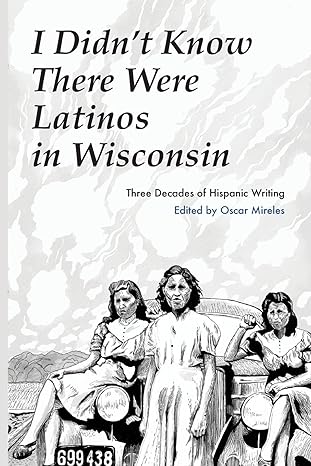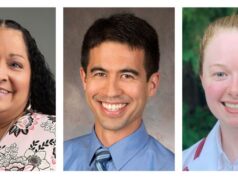Oscar Mireles, an award-winning poet and editor of the three-volume book series, “I Didn’t Know There Were Latinos in Wisconsin,” is putting to gether the fourth edition of that acclaimed anthology, and he has been traveling the state and beyond to find more Latino writers to contribute to it. On Thursday, June 26, 6-8 p.m., Mireles will host a poetry reading at Appleton Public Library in the Mary Beth Nienhaus Community Meeting Room A.
“We’re doing the fourth installment of the book. What’s different this time is that we’re gonna select 50 new writers,” Mireles tells Madison365. “We’ve had close to 100 writers in the other anthologies over the last 30-some years. When I talked to a couple of people about it, they said, ‘Is it just going to be some of the same people?’ I said, ‘Well, no, there are a lot of people that have never been in the book, and there are a lot of new writers that have been born after 30 years. So we’re not even scraping the surface of all the writers that are out there doing great work.’
“So this will be the big thing – 50 new writers, and we’re going to get different stories, different voices, different experiences, because times have changed.”
More than 35 years ago, Mireles published “I Didn’t Know There Were Latinos in Wisconsin: 20 Hispanic Poets” that introduced people to authors of poetry, essay, memoir, and fiction. Writing sometimes in English, sometimes in Spanish, and sometimes in a dynamic mixture of both languages, Mireles’ first anthology helped to extend many narratives of what it means to be Latino/a in the Midwest.
Ten years later, Mireles released “I Didn’t Know There Were Latinos in Wisconsin: 30 Hispanic Writers” through Focus Communications. This third volume in the series, released in 2014, includes the work of more than 30 authors of poetry, essay, memoir, and fiction, demonstrating the breadth and depth of Wisconsin’s Latino/a population.
Mireles was the longtime executive director of Omega School and recently retired after more than three decades helping young people obtain their GEDs. He is also the founder of Latinos Organizing for Understanding and Development (LOUD), which uplifts and supports Latino artists. 
At the Appleton Library on Thursday, Mireles plans to read his poems and share his story.
“I’m going to read a couple of poems from the previous anthologies. There’s going to be people coming to the reading who want to be included in the book,” he says.
Mireles adds that it has been interesting traveling throughout the state and beyond to find the writers for his next book. “We’ve done reading so far at the Racine Public Library, Woodland Pattern bookstore in Milwaukee. We’ve been at the Carnegie-Stout Public Library in Dubuque, Iowa. We’ve been around the state and every time we meet some new writers.
“We’ve been on university campuses, so we’ve got a couple of professors who are academic staff. We’ve been to libraries, so we have a couple of librarians, and then we’ve been going around in the community, too. So it’s a mix of academic and community people and educators and librarians … just a lot of different kinds of voices.”
Mireles, who was the City of Madison’s first Latino poet laureate, says the fourth edition of “I Didn’t Know There Were Latinos in Wisconsin” will be coming out this fall. He says the deadline is July 31st to accumulate writers for the new book and that he has close to 20 writers already.
“We have a lot of people interested in it, but it doesn’t count unless they submit it. So we are encouraging people to do just that. We’ve had many conversations, but I don’t need conversations … I need poems,” Mireles says, smiling.
“Our reading on Thursday at the Appleton Public Library is to really connect with other Latino writers,” he says. “That’s the main thing. I’m going to have a fun time reading, but it’s all about making those connections.
“Most of the anthologies you read, they pick one of the writers, and he invites a few of his friends and then there’s the anthology. So we flip it around. We do pre-publication readings to encourage more people, so it’s more organic, more grassroots, more inclusive, because we’re going out to them.”










